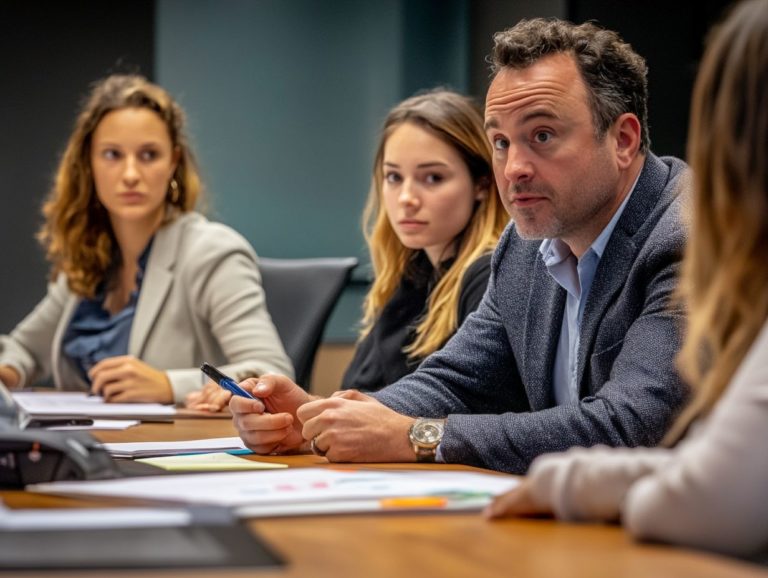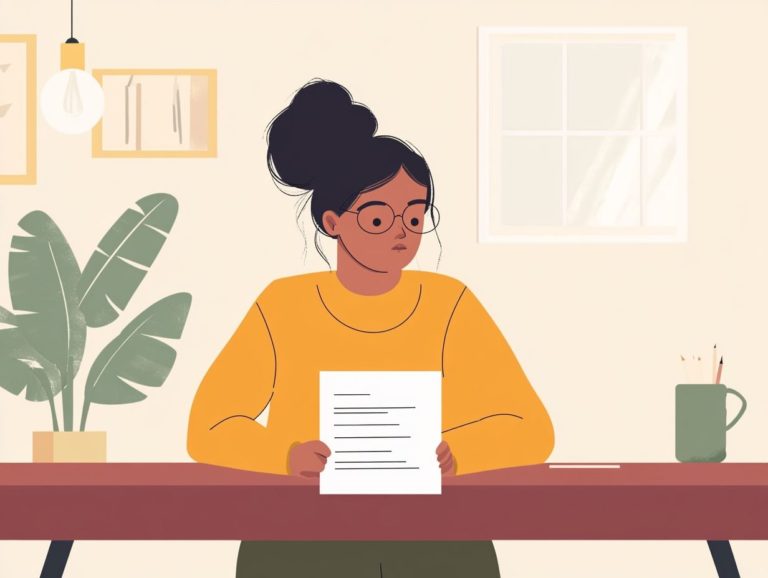5 Signs You’re Winning the Negotiation
Negotiation can often resemble a high-stakes chess match, where every move carries weight. But how can you determine if you re truly winning the conversation?
This article delves into five key signs that suggest you re on the right path. By establishing a solid rapport and recognizing when the other party starts mirroring your language, you can effectively gauge the dynamics at play.
You will also discover essential strategies for preparation, common pitfalls to avoid, and tips for maintaining positive relationships after the negotiation wraps up.
Ready to take your negotiation skills to the next level? Let s dive in!
Contents
- Key Takeaways:
- 1. You Have Established a Good Rapport with the Other Party
- 2. The Other Party Is Willing to Listen and Consider Your Perspective
- 3. You Are Able to Make Concessions without Compromising Your Bottom Line
- 4. The Other Party Is Starting to Use Your Language and Terminology
- 5. You Have Reached a Mutually Beneficial Agreement
- What Are the Key Strategies for Successful Negotiation?
- Frequently Asked Questions
- What are the top 5 signs that you’re winning the negotiation?
- How can you tell if the other party is willing to make concessions?
- What does it mean when the other party is actively engaged and participating in the negotiation?
- How important is clear communication in a negotiation?
- What is the significance of the other party being open to exploring different options?
- Is it necessary for the other party to compromise in order for you to win the negotiation?
Key Takeaways:

- Building rapport is crucial in a negotiation.
- The other party’s willingness to listen is a sign of progress.
- Making concessions without compromising your goals shows effective negotiation skills.
1. You Have Established a Good Rapport with the Other Party
Establishing a solid rapport with the other party is essential for achieving negotiations where both sides win. It creates a productive environment where both parties feel comfortable discussing their interests and underlying perspectives, paving the way for successful negotiation outcomes.
Building trust and rapport not only enhances communication but also fosters an atmosphere where open exchanges are encouraged. One effective technique is active listening. This means fully focusing on the other person without thinking about your response while they re speaking.
For example, when you pause to reflect on the other party’s concerns, it shows that you genuinely understand and respect their viewpoint. Demonstrating empathy for their feelings can significantly strengthen the relationship. Phrases like, “I can see why this is important to you,” can work wonders in breaking down barriers.
Maintaining a calm demeanor and using open body language signals your commitment and willingness to find common ground, fostering a more constructive dialogue.
2. The Other Party Is Willing to Listen and Consider Your Perspective
When the other party shows a genuine willingness to listen and consider your perspective, it signals a promising negotiation process that can lead to mutually beneficial outcomes. This openness not only cultivates trust but also establishes an atmosphere where everyone feels valued and understood.
Active listening is crucial here; it enables you to uncover underlying interests and emotions that may not be explicitly articulated. For instance, by asking open-ended questions like, “What challenges are you facing with this proposal?” you create opportunities for deeper dialogue.
Such inquiries encourage the other party to share more details, revealing insights that could uncover common ground. By embracing this dynamic, you and the other party can shift towards solutions that satisfy your respective interests, ultimately paving the way for a win-win scenario.
3. You Are Able to Make Concessions without Compromising Your Bottom Line
The ability to make mutual concessions without jeopardizing your bottom line is a pivotal component of effective negotiation. This skill allows you to navigate various tactics while keeping your best alternatives intact.
Recognizing underlying interests is essential for achieving this balance. By grasping what each party truly values, you can pinpoint aspects of the deal that are negotiable without compromising critical objectives. For instance, you might discover that one party is open to adjusting delivery timelines if it means securing a more favorable payment structure.
Clearly structuring the negotiation contract to reflect these concessions will not only enhance transparency but also foster a spirit of cooperation.
It’s vital to outline specific terms and seek consensus on the finer details, ensuring that both sides feel appreciated and heard throughout the process.
Don t miss out on these skills that can transform your negotiation outcomes!
4. The Other Party Is Starting to Use Your Language and Terminology

When the other party starts to adopt your language and terminology during negotiations, it signals a shift toward more collaborative dynamics.
This shared foundation fosters deeper understanding. You both can grasp the nuances of your positions more clearly.
For example, using phrases like “let’s explore options that benefit us both” encourages mutual brainstorming.
Actively listening helps establish rapport and reinforces trust.
Techniques such as mirroring their language or summarizing their points can significantly enhance comprehension. This enables you to clarify intentions and navigate potential misunderstandings.
By embracing a language that resonates with both parties, you can create a cooperative environment that leads to better solutions.
5. You Have Reached a Mutually Beneficial Agreement
Reaching a mutually beneficial agreement is crucial. It ensures both parties leave feeling valued and satisfied.
This type of agreement shows clear communication. It reflects understanding and respect for each other’s needs.
To achieve this, actively listen, ask clarifying questions, and remain open to alternative solutions that might not have been initially on the table.
Conducting pre-negotiation assessments can help you identify key interests and potential areas for compromise.
Regular check-ins throughout the negotiation process can help you gauge satisfaction levels, making adjustments as necessary to uphold the integrity of the agreement.
What Are the Key Strategies for Successful Negotiation?
Successful negotiation relies on clear strategies and effective techniques. It focuses on understanding the needs of both parties involved.
By weaving in key strategies like problem-solving, exploring a range of alternatives, and building trust, you can cultivate a more collaborative atmosphere.
This approach fosters open dialogue and encourages the sharing of diverse perspectives, paving the way for innovative solutions.
Emphasizing mutual understanding aligns goals, ensuring that both sides feel acknowledged and valued.
Ultimately, embracing a strategic mindset creates a more productive environment where long-term relationships can flourish.
How Can You Prepare for a Negotiation?
Preparing for a negotiation requires you to grasp the intricacies of the process and anticipate the needs of the other party.
This preparation begins with conducting thorough research on the other party. This illuminates their motivations and preferences while revealing potential areas for compromise.
By setting clear objectives, you can pinpoint what a successful agreement looks like and prioritize those goals accordingly.
It s equally important to cultivate a toolkit of negotiation tactics that align with both sides’ mutual interests. This allows you to adapt fluidly during discussions.
Ultimately, a well-prepared negotiator like yourself can navigate the complexities of the conversation, creating an atmosphere ripe for collaboration and success.
What Are Some Common Mistakes to Avoid in a Negotiation?

Common mistakes in the negotiation process can easily derail effective negotiations. For example, fixating on the fear of loss or allowing emotions to cloud your judgment can stifle the potential for win-win outcomes.
One of the most detrimental pitfalls is failing to actively listen to the other party. This oversight often leads to misunderstandings regarding their true needs and priorities. A lack of attention creates unnecessary tension and results in missed opportunities for fruitful collaboration.
Relying on overly aggressive negotiation tactics may yield short-term victories but can jeopardize long-term relationships and erode trust. By identifying early signs of these missteps like a drop in open communication or an increase in defensiveness you can adjust your approach before it s too late.
Fostering an atmosphere of respect and openness allows you to navigate challenges effectively and achieve outcomes that benefit everyone involved.
How Can You Handle Difficult Negotiation Tactics?
Handling difficult negotiation tactics requires a blend of negotiation skills and problem-solving abilities. This combination helps you navigate challenging situations while staying focused on reaching a mutually beneficial agreement.
Effective negotiation hinges not only on what you say but also on how you say it. For instance, maintaining your composure in the face of aggressive tactics can de-escalate the situation. Instead of mirroring hostility, take a deep breath and calmly acknowledge the other party s concerns. This approach fosters mutual respect.
Reframing the conversation can lead to amazing breakthroughs! Instead of getting ensnared in a win-lose mentality, pivot the discussion toward collaborative solutions. Open-ended questions, like asking how the other party envisions a positive outcome, redirect the focus and promote constructive dialogue.
By adopting these strategies, you can significantly reduce tension and pave the way for productive negotiations.
What Are the Benefits of a Win-Win Negotiation?
Engaging in win-win negotiation offers a wealth of benefits, including enhanced trust and rapport between you and the other party. This approach nurtures long-term relationships and improves negotiation outcomes.
This style of negotiation elevates immediate interactions and lays a solid foundation for future collaborations. When all parties feel valued and understood, everyone wins.
For example, consider a recent scenario involving a tech firm and a supplier. Both sides took the time to assess their needs and crafted a solution that maximized efficiency and minimized costs. As a result, they secured a favorable deal and forged a partnership that blossomed beyond the initial agreement.
These scenarios exemplify how win-win negotiations cultivate sustainable business relationships, fostering an environment of cooperation rather than competition, ultimately benefiting everyone involved.
How Can You Maintain a Positive Relationship with the Other Party After Negotiation?
Maintaining a positive relationship with the other party after a negotiation is essential for ongoing collaboration. Rely on mutual concessions and continued communication to build a lasting partnership.
Regular follow-up communications are crucial. A simple thank-you email can set the tone for a respectful connection, while periodic check-ins allow both parties to address any emerging concerns or opportunities.
These strategies reinforce commitments made during the negotiation and demonstrate a genuine investment in each other’s success. By nurturing this dialogue, you cultivate trust and rapport, leading to smoother interactions in future negotiations and a stronger professional bond.
Frequently Asked Questions

Ready to master your next negotiation? Start implementing these strategies today!
What are the top 5 signs that you’re winning the negotiation?
The top 5 signs that you’re winning the negotiation are:
- The other party is willing to make concessions.
- They actively engage and participate.
- You communicate clearly, and they acknowledge your points.
- They explore options and seek compromises.
- They show signs of shifting towards your goals.
How can you tell if the other party is willing to make concessions?
Look for signs in their body language and tone. They might express their willingness to compromise or suggest new solutions.
What does it mean when the other party is actively engaged and participating in the negotiation?
If the other party is actively engaged, it means they are invested in finding a win-win outcome and are committed to reaching an agreement.
How important is clear communication in a negotiation?
Clear communication is crucial as it helps both parties understand each other’s perspectives and find common ground. This way, you can avoid misunderstandings and ensure everyone is aligned.
What is the significance of the other party being open to exploring different options?
When the other party is open to different options, it shows flexibility and a willingness to consider alternatives. This openness can lead to a more successful negotiation, as both parties can find creative solutions.
Is it necessary for the other party to compromise in order for you to win the negotiation?
No, the other party doesn’t need to compromise for you to win. Winning means reaching a mutually beneficial agreement, not necessarily getting everything you initially wanted. Remember, a good negotiation is about collaboration, not just winning.






